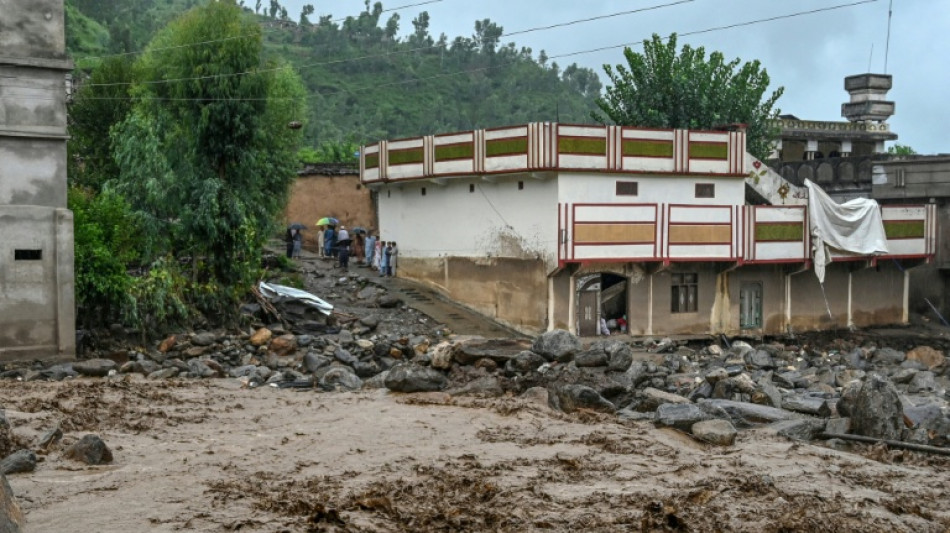
| SCS | 0.12% | 16.14 | $ | |
| RBGPF | -0.68% | 80.71 | $ | |
| NGG | 0.01% | 77.645 | $ | |
| AZN | -0.14% | 92.77 | $ | |
| BTI | -0.07% | 57.23 | $ | |
| RIO | -2.47% | 80.26 | $ | |
| CMSC | 0% | 23.09 | $ | |
| RELX | 0.57% | 41.344 | $ | |
| BCC | -0.97% | 74.405 | $ | |
| BCE | 1.52% | 23.405 | $ | |
| RYCEF | -0.84% | 15.4 | $ | |
| GSK | 0.1% | 49.13 | $ | |
| BP | 0.63% | 34.486 | $ | |
| JRI | 0.37% | 13.52 | $ | |
| CMSD | -0.13% | 23.08 | $ | |
| VOD | 0.33% | 13.163 | $ |

Rain halts rescue operation after Pakistan floods kill hundreds
Rain on Monday halted search and rescue operations in northern Pakistan after flash floods that have killed nearly 350 people with around 200 still missing, officials said.
Torrential rains across the country since Thursday have caused flooding, rising waters and landslides that have swept away entire villages and left many residents trapped in the rubble.
Most of the deaths -- more than 320 -- were reported in northwestern Khyber Pakhtunkhwa province, according to the provincial disaster agency, which warned of new flash floods "till Thursday".
Volunteers had been assisting hundreds of rescue workers in their race against time to find possible survivors and retrieve bodies as fresh rains started lashing the province.
"This morning fresh rains forced a halt to relief operations," said Nisar Ahmad, 31, a volunteer in worst-hit Buner district, where "12 villages have been completely wiped out and 219 bodies have been recovered".
"Dozens of bodies are still buried under the mud and rocks, which can only be recovered with heavy machinery. However, the makeshift tracks built to access the area have once again been destroyed by the new rains," he added.
Around 200 people are still missing in Khyber Pakhtunkhwa province, according to local authorities.
- 'We feel scared' -
Many people fled to seek shelter under damaged infrastructure and in the mountains in Buner, an area with difficult terrain.
"Even if it rains a little now, we feel scared because there was light rain that day. And then the unsuspecting people were swept away by the storm," said Buner resident Ghulam Hussain, 35.
"Children and women are running and screaming up the mountains to escape," Hazrat Ullah, 18, told AFP.
Volunteer Ahmad said there were also fears for the future due to a lack of food supplies and clean water.
"Many livestock have also perished in the cloudburst, and their decomposing bodies are spreading a foul odour in several places. Right now, our most urgent need is clean drinking water, and I appeal to the government to provide it," he said.
The monsoon season brings about three-quarters of South Asia's annual rainfall, which is vital for agriculture and food security but also causes widespread destruction.
According to the National Disaster Agency, the intensity of this year's monsoon is about 50 to 60 percent higher than last year.
Landslides and flash floods are common during the monsoon season, which typically begins in June and lasts until the end of September.
The heavy rains that have battered Pakistan since the start of the summer monsoon have claimed the lives of more than 650 people, with over 920 injured.
Pakistan is among the world’s most vulnerable countries to the effects of climate change and is increasingly facing extreme weather events.
In 2022, monsoon floods submerged one-third of the country and resulted in approximately 1,700 deaths.
V.Bellini--GdR



